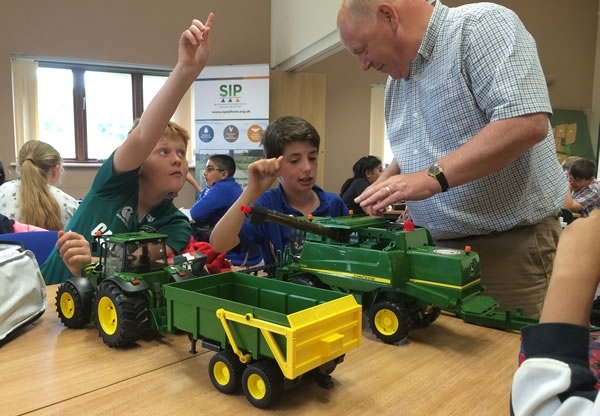 By Amelia Woolford, Project Development Officer, The Allerton Project.
By Amelia Woolford, Project Development Officer, The Allerton Project.
Two groups of year 6 children recently joined the Allerton Project for a farm visit to learn about farming, food production and wildlife.
We kicked off the day with a scavenger hunt, where the children had to find something on the farm or in the surrounding countryside for each letter of the alphabet, finding plenty of wildlife such as a slow worm and a violet ground beetle as they searched.
They were then given a ‘show and tell’ tree which they shared with the rest of the group and then sat for 90 seconds of silence. By managing to stay quiet for this time they could then recall all of the sounds, such as birdsong, which they might not take notice of everyday.
The visit to our farm is one in a series of three visits, along with trips to the seaside and a town, designed to allow the children to compare what they have learnt and heard in each environment.
Over lunch we had the chance to talk about cultivation methods and harvest. Thanks to a kind donation from John Deere we are able to use scale models of a combine, bailer and tractor to demonstrate how they are used on the farm for food production.

Jim Egan had visited the school in February prior to the visit and planted beans and oats in a raised bed within the school grounds. The children were able to look after their crops in this time and watch them grow. They then brought along a cutting for a bit of friendly competition with farmer Phil and were pleased to discover that their crops were bigger and greener - Sorry Phil!
The children were able to see what it takes to grow food on a larger scale and what the crops need in order to thrive. In a partnership with Kellogg’s Origins we are able to educate schools about where their food comes from and how many boxes of cereal come from one square metre of crop (two!) which means a possible 20,000 boxes of cereal can be produced from one hectare alone.

Despite the children’s crops being larger, they were able to recognise that because they have fewer plants to manage and weed control is done by hand in a small bed, it’s easier to grow a healthy crop. They can then appreciate the busy life a farmer has tending to his land daily and must spray crops to reduce competition from weeds.
The year 6’s had a great day exploring the farm and had an all-round ‘farm to fork’ experience.
Please support our important work at the Allerton Project
With your help we'll be able to continue to provide unique education opportunities for children.